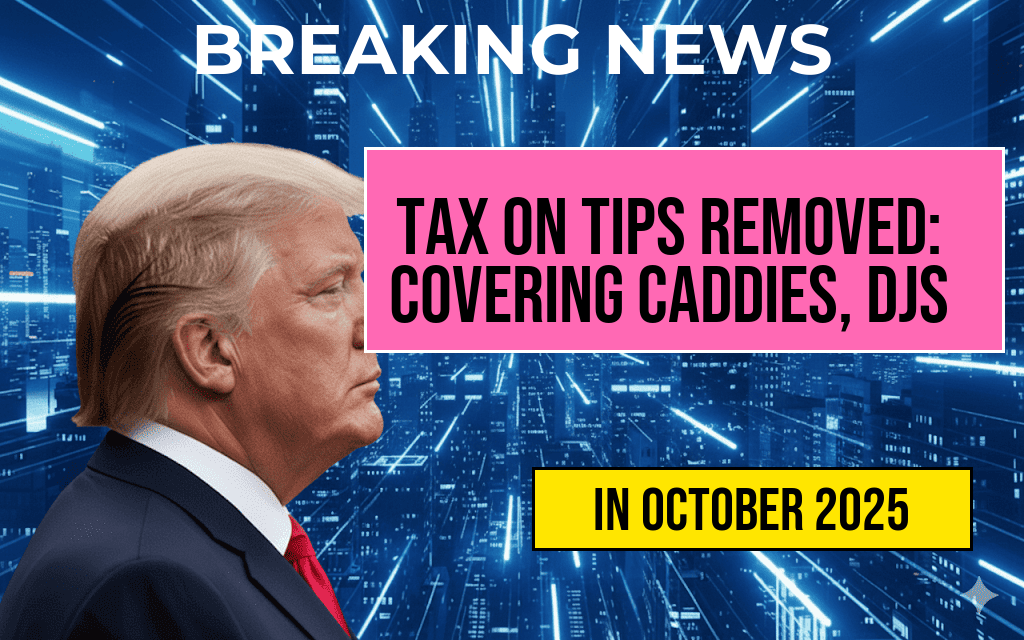In a recent move to simplify the tax code for individual filers, the IRS has announced the elimination of the longstanding tax on tips. This change is part of broader efforts to reduce administrative burdens and streamline tax reporting procedures. Additionally, the IRS has increased the $25,000 deduction threshold for miscellaneous expenses, potentially allowing workers such as golf caddies and DJs to deduct more of their business-related costs. These adjustments could significantly impact service industry professionals, especially those with fluctuating income streams and numerous deductible expenses. The move aims to provide relief for independent contractors and small-business owners, reflecting ongoing efforts to modernize tax policies in response to changing work environments and economic conditions.
Tax on Tips: History and Implications
For decades, tips received by service workers have been subject to federal income tax, with specific rules governing how they are reported and taxed. Traditionally, employees such as waitstaff, bartenders, and hotel staff have been required to report tips exceeding $20 monthly, with employers responsible for withholding appropriate taxes. However, the IRS has now decided to eliminate the tax on tips altogether, aligning with recent legislative initiatives aimed at reducing compliance complexities for workers in the hospitality industry.
This change simplifies the reporting process for service workers, who often face challenges tracking and documenting their tips accurately. It also aims to address concerns about underreporting and the tax burden on low- and middle-income earners. The IRS indicates that the policy shift could potentially increase tip reporting transparency, as workers no longer need to worry about tax penalties for tips that were previously unreported or underreported.
Enhanced Deduction Limits for Miscellaneous Expenses
Alongside the tip tax removal, the IRS has increased the $25,000 deduction threshold for miscellaneous expenses, which can include a variety of work-related costs. For professionals such as golf caddies, DJs, and other independent contractors, this change could significantly reduce taxable income by allowing them to deduct more expenses directly related to their trade.
Previously, the deduction limit was more restrictive, often forcing workers to itemize and justify individual expenses meticulously. The new higher threshold simplifies this process, offering a clearer pathway to claim deductions for costs like equipment, transportation, and other operational expenses. The increased limit is part of a broader effort to recognize the diverse nature of gig and freelance work, which often involves unique and variable costs.
Who Benefits from the Changes?
The reform primarily targets small-business owners, gig workers, and independent contractors who often face complex tax obligations and limited access to traditional tax benefits. Golf caddies, who typically work seasonally and rely heavily on tips, stand to benefit from the removal of the tip tax, enabling them to retain more of their earnings. Similarly, DJs and event entertainers, who frequently incur equipment, transportation, and promotional expenses, could see a reduced tax liability thanks to the increased deduction limit.
Potential Impact on the Service Industry
- Increased disposable income: With fewer taxes on tips, workers in hospitality and entertainment sectors may experience immediate financial relief.
- Simplified tax filing: The higher deduction threshold reduces administrative hurdles, especially for those with variable or unpredictable income and expenses.
- Greater transparency: Removing the tip tax could encourage more accurate reporting and reduce tax evasion concerns.
Expert Perspectives and Future Outlook
Tax analysts suggest the policy changes reflect a recognition of the evolving nature of work in the United States, where gig and freelance roles constitute a growing share of the economy. Tax experts note that these reforms may set a precedent for further adjustments tailored to contemporary employment patterns.
While the elimination of the tip tax offers immediate benefits, some critics caution that it could complicate income verification and enforcement efforts. Nonetheless, the IRS emphasizes that these reforms are designed to streamline compliance and support workers whose earnings are often unstable and difficult to track.
Additional Resources and References
| Aspect | Previous Policy | Revised Policy |
|---|---|---|
| Tax on Tips | Mandatory reporting and taxation for tips over $20/month | Eliminated entirely |
| Deduction Limit for Miscellaneous Expenses | $25,000 | Increased to a higher threshold (specific new limit pending clarification) |
For more on the evolving landscape of U.S. tax policy, visit Forbes or consult the Wikipedia page on U.S. taxation.
Frequently Asked Questions
Will the tax on tips be completely eliminated?
Yes, the recent change in legislation eliminates the tax on tips, providing relief for workers who rely on gratuities for income.
What is the significance of the $25,000 deduction mentioned in the article?
The $25,000 deduction may be enough to cover expenses for roles such as golf caddies and DJs, potentially reducing their taxable income significantly.
Who benefits from the tax elimination on tips?
Workers in service industries who earn tips, including caddies, DJs, waitstaff, and bartenders, stand to benefit from the tax removal.
How might this change affect service workers financially?
This change could lead to increased take-home pay for service workers by removing the tax burden on their gratuities and allowing larger deductions for related expenses.
Are there any specific expenses that can now be deducted under the new rules?
Yes, expenses such as those for golf caddies, DJs, and other service-related roles may now be deductible up to $25,000, helping workers offset their income.






